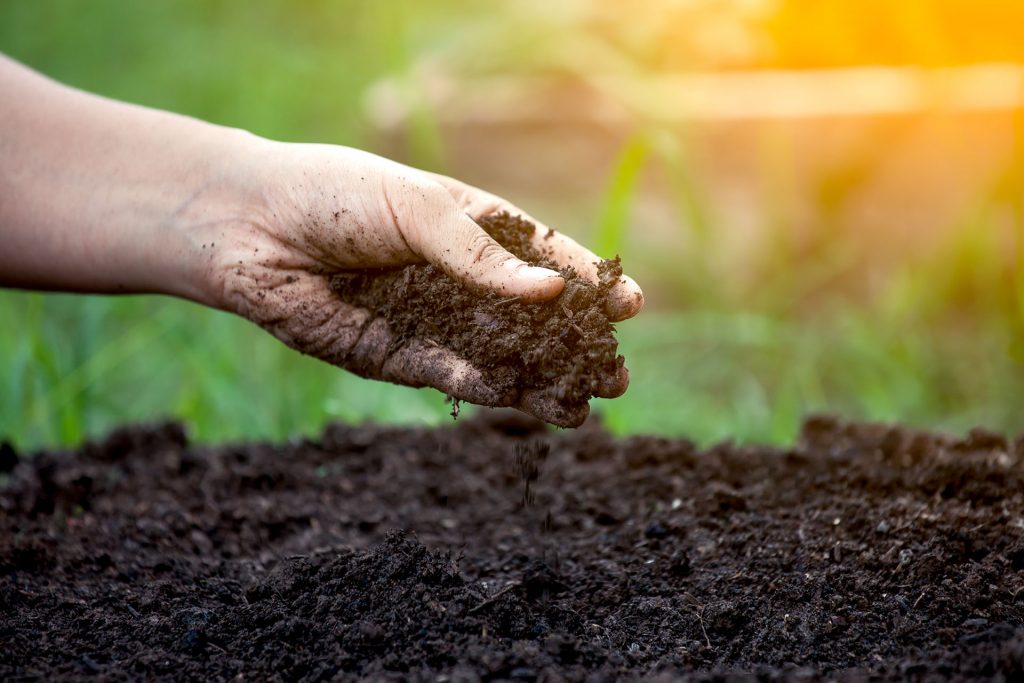
If you browse around your local supermarket, you’ll notice more and more products advertising themselves as organic. Whether it’s healthier for you, better for the environment, or just a clever marketing gimmick, we all have a pretty good idea of what it means. Organic food products are produced without the use of chemical pesticides and fertilizers. But what about an organic lawn? Maybe you’ve never heard of such a thing. Perhaps it seems like it could never work. But think again. If entire farms can run without adding artificial chemicals, your lawn can thrive without them, too. Organic lawn care isn’t just a slogan. It’s a different approach to lawn care that balances a beautiful lawn with the health and safety of organic farming (or lawn care) practices.
The Principle Behind Organic Lawn Care
Organic lawn care isn’t just a method. It’s a way of thinking about lawn care. Traditional lawn care often focuses on what you can see. Do you see weeds? Apply a selective herbicide. Do you expect to see weeds? Apply a preemergent herbicide. Do you want a bright green vigorous lawn? Apply a chemical fertilizer. There’s nothing wrong with that approach, and it definitely gets results if you do it right. But there is another way of thinking about lawn care that uses fewer chemicals or even no chemicals and still provides a lawn you can be proud of.
The principle behind organic lawn care is that it’s all about what you can’t see, namely the soil. Healthy soil grows healthy turf. Soil, of course, is much more than just dirt. Healthy soil is a living entity. It is full of organic matter and plants and animals, from microscopic bacteria and protozoa to fungi and earthworms. Healthy soil is just teeming with life, and encouraging the right sorts of organisms to flourish in your soil is the best way to keep your grass healthy.
To keep your living soil as happy and healthy as possible, organic lawn care practices attempt to feed and care for the soil just as much as they feed the grass. To do that, organic lawn care uses a variety of tools and methods, including composting, aeration, topdressing, and overseeding.
But just as important as the how of organic lawn care, we need to address the why. Why should you bother with organic lawn care? Here are a few reasons you might want to consider this alternate path to a vibrant turf lawn.
![What is Organic Lawn Care [infographic]](https://theturfgrassgroup.com//wp-content/uploads/2020/09/What-is-Organic-Lawn-Care-infographic.jpg)
Why You Should Consider Organic Lawn Care
When we think of organic food, the purported benefits include your health—it’s healthier to eat— and the planet’s health—it’s healthier to grow and produce. Obviously, you won’t be eating your turf, so we’re left with only the second reason—it’s better for the planet. But you’re not just doing a favor to your Mother Earth. Organic lawn care has plenty of benefits. Some of them are immediate, and some are about the environment. Here are a few.
It’s Safer for People and Pets
When you purchase regular (non-organic) fertilizers and pesticides, you’ll find some pretty strong warnings on the back of the package “Store carefully! Do not ingest! Do not use around anything you plan to eat! Keep away from children and pets!” But organic lawn care products are not quite as toxic. While we still wouldn’t recommend ingesting them, they are typically harmless to people and pets. There’s no need to wait a long time after application before it’s safe to play on your lawn. While you may want to give some time for your new layer of compost to settle in, if your child or furry friend runs out onto your lawn, there’s no need to worry. And there’s nothing wrong with splashing a little of that organic mulch onto your vegetable garden. (We assume you wash those veggies after you pick them.) So if saving the planet seems like a far off goal that you are only just barely contributing to, consider the immediate benefits to your family.
It Won’t Pollute Local Waterways
If saving the planet seems like a heavy lift, think small and local. Using organic products can help protect your local waterways, from the creek that runs through your neighborhood to the water that you drink. One common problem with chemical fertilizers is how the runoff can affect local waterways. Nitrogen and phosphorus that get into storm drains can end up in lakes and rivers where it damages the fragile ecosystem. It can hurt some organisms directly and contribute to algae blooms that can ruin entire bodies of water.
Organic fertilizers are less polluting. While they do contain levels of nutrients that are not desirable in local waterways, they are less prone to runoff. The nutrients are contained in products like manure and compost, which aren’t as easily washed away as liquid or pellet chemical fertilizers. Over time, enhancing your soil with organic lawn care practices can also reduce runoff in general, helping save water and prevent local water pollution.
You’ll Have Great Soil
As we’ve said, organic lawn care is all about the soil. The more you follow organic lawn care practices, the better your soil will become. Loamy soil that teems with life is the best way to promote vigorous turf growth. When soil is healthy with plenty of air pockets, it can hold onto water and nutrients, and roots grow thick and deep. Thick roots can soak up even more water and nutrients, leading to a more hardy and drought-tolerant lawn. And grass that grows strong and thick crowds out weeds, so you’ll spend less time weeding and won’t have as much need for herbicides.
Your Improvements Last
When you fertilize with chemical fertilizers, you are replacing depleted nutrients. That’s a good thing, and it gives your grass what it needs to grow strong and healthy. But once the grass has used up those nutrients, you’ll have to replace them again. This is an ongoing cycle of depletion and replacement.
Organic lawn care, on the other hand, functions more like nature. In nature, there is no regular infusion of pure nitrogen, phosphorus, or other nutrients. Instead, the nutrients to keep things growing come from decomposing organic matter, and they are maintained and helped along by the living organisms in the soil. And that’s how organic lawn care works. There are times to add nutrients, but the goal is to create a healthy ecosystem in your soil that can keep your turf fed in the long-term. The main additive is organic compost or manure, similar to what you might find in nature. Instead of just replacing what’s gone, you nourish a life cycle that includes your turf grass and benefits the soil, its organisms, and the plants growing in the soil.
Starting an Organic Lawn
If you want to grow an organic lawn, you can’t start with lousy turf. While it might be possible to rehabilitate a dying lawn with organic methods, you would likely have to overseed at least and possibly resod. So don’t start from behind. Instead, plan your organic lawn by laying down the best turf you can get your hands on. The Turfgrass Group sells only pure, certified varieties scientifically developed and tested for hardiness and vitality. Fortify your organic lawn care regimen by starting with turf that is developed to be drought-tolerant, withstand foot traffic and other abuse, and green up better than any other variety. The better your turf is, the less you will need to do to keep it green. So check out our fantastic turf varieties and pick the one that suits you best. You can find local growers for all our varieties right here.
